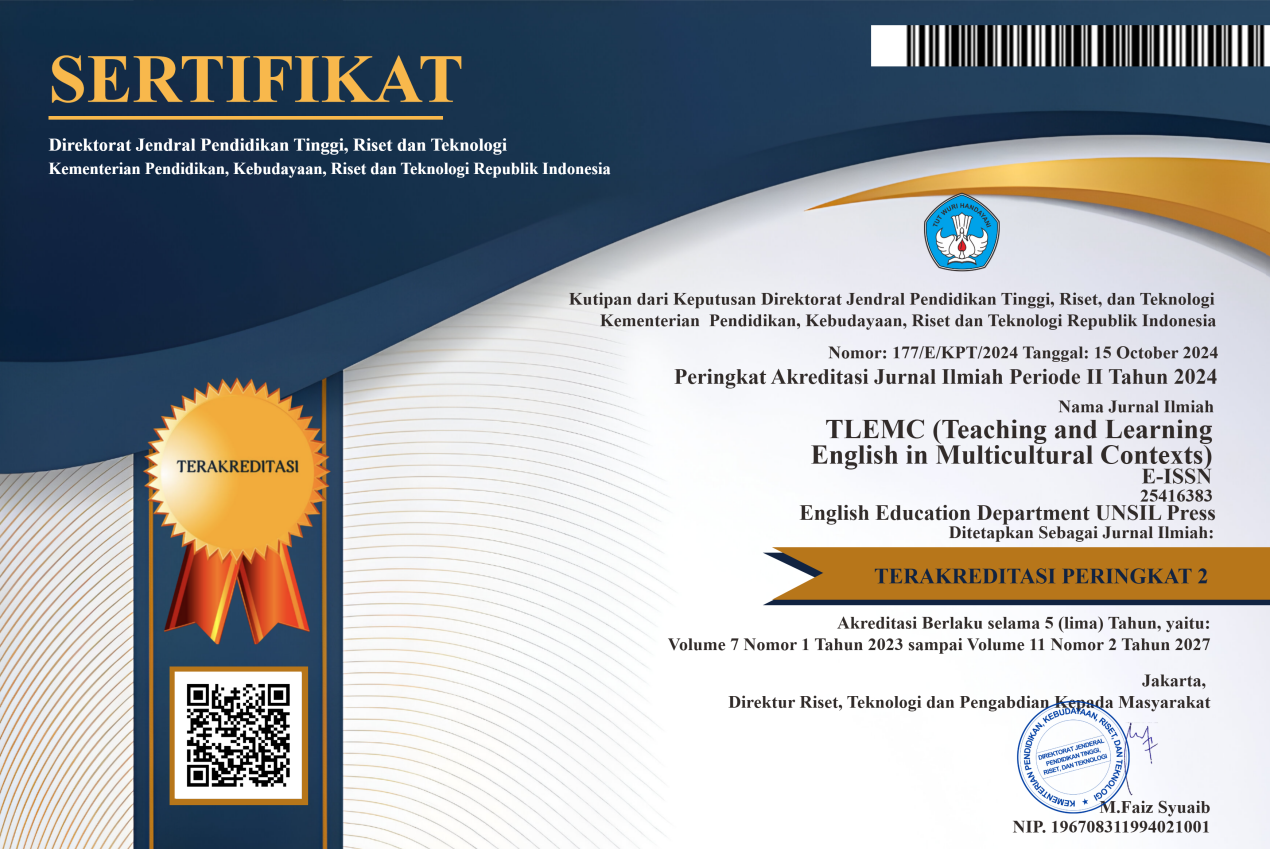Analysis of Speech Acts in Conversations Between Characters in the Film “Good Will Hunting (1997)”
Abstract
Language is a crucial component of communication and serves as the foundation for interactions. In linguistics, there is a branch called pragmatics that studies speech acts. Pragmatics provides a framework for analyzing the relationship between language and context. Related to pragmatics, this research explores the classifications of speech acts in the film "Good Will Hunting (1997)”. This research aims to analyze the type of speech acts, as proposed by Searle (1976), that can be found in conversations between the characters Will Hunting and Sean Maguire. The film offers a narrative canvas to investigate representatives, directives, commissives, expressives, and declaratives. A descriptive qualitative method was employed in this research. The data was collected by employing attentive listening and note-taking methods and analyzed using descriptive and interpretative techniques. The findings of this research reveal a total of 61 speech acts, with representatives being the most dominant type with a total of 43 speeches, followed by directives totaling 8 speeches, 6 expressives, and both commissives and declaratives totaling 2 speeches each. The implications of these findings extend to a nuanced understanding of interpersonal communication in cinematic contexts.
Keywords : pragmatics, speech acts, illocutionary acts
Full Text:
PDFReferences
Ariesta, E. N., & Simatupang, E. C. (2019). The Illocutionary Acts in the Movie The Death Cure: Pragmatics Study. Journal Sampurasun: Interdisciplinary Studies for Cultural Heritage. https://doi.org/10.23969/sampurasun.v5i2.1782
Austin, J. L. (1962). How to do things with words. USA: Harvard University Press.
Cutting, J. (2002b). Pragmatics and Discourse: a resource book for students. http://ci.nii.ac.jp/ncid/BA56486975
Dewi, N., & Surya, D. A. W. (2023). Speech Acts Analysis of Spiderman No Way Home Movie as A Medium of Learning Material. TLEMC (Teaching and Learning English in Multicultural Contexts), 7(1), 42-51.
Fahrudin, S., Idawati, I., & Salamah, S. (2021c). Types of Speech acts in the short film Nilep (2015). Proceedings of the 2nd Borobudur International Symposium on Humanities and Social Sciences, BIS-HSS 2020, 18 November 2020, Magelang, Central Java, Indonesia. https://doi.org/10.4108/eai.18-11-2020.2311797
Hornby, A.S. (2006). Oxford Advanced Learner’s Dictionary. Oxford University Press
Lincoln, Y. S., Guba, E. G., & Pilotta, J. J. (1985). Naturalistic inquiry. International Journal of Intercultural Relations, 9(4), 438–439. https://doi.org/10.1016/0147-1767(85)90062-8
Paelongan, N., Natsir, M., & Ariani, S. (2018). The Illocutionary Acts Produced by Peter Quill Character in the Guardians of the Galaxy Movie by James Gunn. Ilmu Budaya: Jurnal Bahasa, Sastra, Seni, dan Budaya, 3(1), 35-43.
Searle, J. (1976). A Classification of Illocutionary Act. California: Cambridge University Press
Silvani, D. (2020). Learning through Watching: Using Animation Movie to Improve Students’ Writing Ability. Journal of English Language Teaching and Linguistics, 5(2), 233-247.
Sokolova, E. Y., Golovacheva, E. A., & Chernaya, A. A. (2015). Professionally-Oriented Communicative Language Teaching Approach by the Design of a Computer Assisted ESP Course: Analysis of Results. Procedia - Social and Behavioral Sciences, 215. https://doi.org/10.1016/j.sbspro.2015.11.619
Sumaniari, N. W. R., Ramendra, D. P., & Mahendrayana, G. (2021). An analysis of speech acts in Merry Riana : Mimpi Sejuta Dollar Movie. Jurnal Pendidikan Bahasa Inggris Undiksha, 9(1), 69. https://doi.org/10.23887/jpbi.v9i1.34189
Wijaya, N., & Setyo Utami, L. S. (2021). Pengaruh Penyampaian Informasi pada Aplikasi TikTok terhadap Perilaku Konsumtif Generasi Z. Prologia, 5(2). https://doi.org/10.24912/pr.v5i2.10171
Willems, E. P. (1967). Toward an explicit rationale for naturalistic research methods. Human Development, 10(3–4), 138–154. https://doi.org/10.1159/000270581
Yule, G., & Widdowson, H. G. (1996). Pragmatics. OUP Oxford.
Zis, S. F., Effendi, N., & Roem, E. R. (2021). Perubahan Perilaku Komunikasi Generasi Milenial dan Generasi Z di Era Digital. Satwika: Kajian Ilmu Budaya Dan Perubahan Sosial, 5(1). https://doi.org/10.22219/satwika.v5i1.15550s
DOI: https://doi.org/10.37058/tlemc.v7i2.9413
Refbacks
- There are currently no refbacks.
INDEXED BY:
This work is licensed under a Creative Commons Attribution-NonCommercial-ShareAlike 4.0 International License.
![]()
TLEMC (Teaching and Learning English in Multicultural Contexts)
Program Studi Pendidikan Bahasa Inggris
Fakultas Keguruan dan Ilmu Pendidikan
Universitas Siliwangi
Jl. Siliwangi No. 24 Kota Tasikmalaya - 46115
email: tlemc@unsil.ac.id





